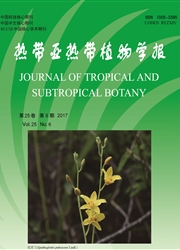

 中文摘要:
中文摘要:
为了探索提高香根草(Vetiveria zizanioides)遗传种质改良效率的有效途径,初步研究了影响香根草体细胞胚胎发生和植株再生的若干因素。以MS培养基为基本培养基,附加不同配比的生长素和细胞分裂素,对香根草的腋芽及无菌不定芽进行离体培养。结果表明,2,4-D是诱导体细胞胚胎发生的关键因素,当培养基中只含2,4-D而不含或少含细胞分裂素(6-BA)时,外植体经由体细胞胚胎发生途径形成再生植株。愈伤组织诱导频率在有的品种之间差异显著,最高的达到96.7%(cv.Zomba),最低的不到30%(cv.Malaysia);而有的品种之间著异不显著(例如cv.Kandy和cv.Sunshine)。胚性愈伤组织的再生能力可以长期保持,从未经继代培养的到持续继代第23代的胚性愈伤组织,再生频率都在80%以上,而且再生植株的生长良好。在3—7℃的低温下进行分化培养时,仍然有40.5%-50.0%不同世代的胚性愈伤组织还保持着再生能力。
 英文摘要:
英文摘要:
Axillary buds and aseptic adventitious buds of vetiver (Vetiveria zizanioides (L.) Nash) were used as explants to investigate the factors that affected somatic embryogenesis and plant generation. The explants were cultured on MS medium supplemented with 2,4-dichlorophenoxyacetic acid (2,4-D) or and 6-benzyladenine (6-BA). The results showed the explants could regenerate via somatic embryogenesis when the medium contained only 2,4-D without or with little content of 6-BA. Callus induction frequency in different cultivars was significantly varied, eg: cv. Zomba had highest induction frequency, up to 96.7%, but cv. Malaysia the lowest, less than 30%, whereas that in cv. Kandy and cv. Sunshine was almost the same. Regeneration ability in embryonic calli could be maintained for a long time, the regeneration frequency being still over 80%, regardless of subculture times from 0 to 23. The differentiation ability of embryonic calli was inhibited at temperature of 3-7 ℃, under which only 40.5%-50.0% of them could regenerate.
 同期刊论文项目
同期刊论文项目
 同项目期刊论文
同项目期刊论文
 期刊信息
期刊信息
